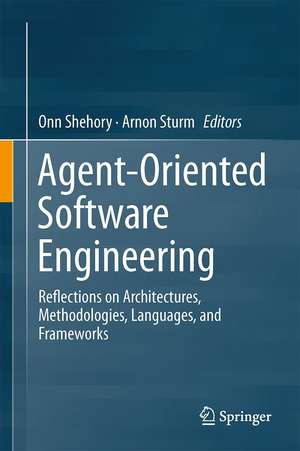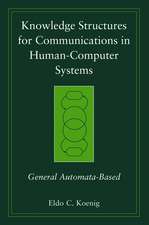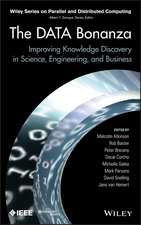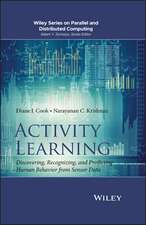Agent-Oriented Software Engineering: Reflections on Architectures, Methodologies, Languages, and Frameworks
Editat de Onn Shehory, Arnon Sturmen Limba Engleză Hardback – 24 iun 2014
The book chapters are organized into five parts. The first part introduces the AOSE domain in general, including introduction to agents and the peculiarities of software engineering for developing MAS. The second part describes general aspects of AOSE, like architectural models, design patterns and communication. Next, part three discusses AOSE methodologies and associated research directions and elaborates on Prometheus, O-MaSE and INGENIAS. Part four then addresses agent-oriented programming languages. Finally, the fifth part presents studies related to the implementation of agents and multi-agent systems.
The book not only provides a comprehensive review of design approaches for specifying agent-based systems, but also covers implementation aspects such as communication, standards and tools and environments for developing agent-based systems. It is thus of interest to researchers, practitioners and students who are interested in exploring the agent paradigm for developing software systems.
| Toate formatele și edițiile | Preț | Express |
|---|---|---|
| Paperback (1) | 647.93 lei 6-8 săpt. | |
| Springer Berlin, Heidelberg – 23 aug 2016 | 647.93 lei 6-8 săpt. | |
| Hardback (1) | 654.37 lei 6-8 săpt. | |
| Springer Berlin, Heidelberg – 24 iun 2014 | 654.37 lei 6-8 săpt. |
Preț: 654.37 lei
Preț vechi: 817.96 lei
-20% Nou
Puncte Express: 982
Preț estimativ în valută:
125.21€ • 131.08$ • 103.61£
125.21€ • 131.08$ • 103.61£
Carte tipărită la comandă
Livrare economică 05-19 aprilie
Preluare comenzi: 021 569.72.76
Specificații
ISBN-13: 9783642544316
ISBN-10: 3642544312
Pagini: 331
Ilustrații: XIV, 331 p. 59 illus., 5 illus. in color.
Dimensiuni: 155 x 235 x 25 mm
Greutate: 0.66 kg
Ediția:2014
Editura: Springer Berlin, Heidelberg
Colecția Springer
Locul publicării:Berlin, Heidelberg, Germany
ISBN-10: 3642544312
Pagini: 331
Ilustrații: XIV, 331 p. 59 illus., 5 illus. in color.
Dimensiuni: 155 x 235 x 25 mm
Greutate: 0.66 kg
Ediția:2014
Editura: Springer Berlin, Heidelberg
Colecția Springer
Locul publicării:Berlin, Heidelberg, Germany
Public țintă
ResearchCuprins
A Brief Introduction to Agents.- Agent-Oriented Software Engineering – Revisiting the State-of-the-Art.- Application Impact of Multi-Agent Systems and Technologies: A Survey.- Multi-Agent Systems: A Software Architecture Viewpoint.- Design Patterns for Multi-Agent Systems: A Systematic Literature Review.- Agent Communication.- The Landscape of Agent-Oriented Methodologies.- Prometheus Research Directions.- O-MaSE: An Extensible Methodology for Multi-Agent Systems.- Ten Years of the INGENIAS Methodology.- A Survey of Multi-Agent Programming.- Languages and Frameworks.- GOAL: A Multi-Agent Programming Language Applied to an Exploration Game.- Unravelling Multi-Agent Oriented Programming.- The Evolution of MAS Tools.- Design and implementation of very large agent-based systems.- Agent Zero: A Framework for Simulating and Evaluating Multi-Agent Algorithms.
Recenzii
From the book reviews:
“This book is a comprehensive introduction to the field, with contributors drawn from the major groups working in the domain. … the reader has an authentic opportunity for exposure to the state of the art. … the dominant audience for this book will be drawn from the community of researchers and graduate students in the field, I also commend it as a valuable read for software engineering practitioners interested in fresh perspectives on distributed systems development.” (Liz Sonenberg, Computing Reviews, September, 2014)
“This book is a comprehensive introduction to the field, with contributors drawn from the major groups working in the domain. … the reader has an authentic opportunity for exposure to the state of the art. … the dominant audience for this book will be drawn from the community of researchers and graduate students in the field, I also commend it as a valuable read for software engineering practitioners interested in fresh perspectives on distributed systems development.” (Liz Sonenberg, Computing Reviews, September, 2014)
Notă biografică
With this book, Onn Shehory and Arnon Sturm, together with further contributors, introduce the reader to various facets of agent-oriented soft ware engineering (AOSE). They provide a selected collection of state-of-the-art findings, which combines research from information systems, artificial intelligence, distributed systems, and soft ware engineering and covers essential development aspects of agent-based systems.
The book chapters are organized into five parts. The first part introduces the AOSE domain in general, including introduction to agents and the peculiarities of soft ware engineering for developing MAS. The second part describes general aspects of AOSE, like architectural models, design patterns, and communication. Next, part three discusses AOSE methodologies and associated research directions, and elaborates on Prometheus, O-MaSE, and INGENIAS. Part four then addresses agent-oriented programming languages. Finally, the fifth part presents studies related to the implementation of agents and multi-agent systems.
The book not only provides a comprehensive review of design approaches for specifying agent-based systems, but also covers implementation aspects such as communication, standards, and tools and environments for developing agent-based systems. It is thus of interest to researchers, practitioners, and students who are interested in exploring the agent paradigm for developing soft ware systems.
“The present volume is a state-of-the-art collection of articles on agent-oriented soft ware engineering. The articles presented herein address issues from methodologies to programming languages and development platforms. While this volume may not mark the end of the story of agent-oriented soft ware development, it does, I think, represent an important milestone in the history of the field, and will surely prompt much future research and development.”
From the Foreword by Michael Wooldridge, University of Oxford,UK
The book chapters are organized into five parts. The first part introduces the AOSE domain in general, including introduction to agents and the peculiarities of soft ware engineering for developing MAS. The second part describes general aspects of AOSE, like architectural models, design patterns, and communication. Next, part three discusses AOSE methodologies and associated research directions, and elaborates on Prometheus, O-MaSE, and INGENIAS. Part four then addresses agent-oriented programming languages. Finally, the fifth part presents studies related to the implementation of agents and multi-agent systems.
The book not only provides a comprehensive review of design approaches for specifying agent-based systems, but also covers implementation aspects such as communication, standards, and tools and environments for developing agent-based systems. It is thus of interest to researchers, practitioners, and students who are interested in exploring the agent paradigm for developing soft ware systems.
“The present volume is a state-of-the-art collection of articles on agent-oriented soft ware engineering. The articles presented herein address issues from methodologies to programming languages and development platforms. While this volume may not mark the end of the story of agent-oriented soft ware development, it does, I think, represent an important milestone in the history of the field, and will surely prompt much future research and development.”
From the Foreword by Michael Wooldridge, University of Oxford,UK
Textul de pe ultima copertă
With this book, Onn Shehory and Arnon Sturm, together with further contributors, introduce the reader to various facets of agent-oriented software engineering (AOSE). They provide a selected collection of state-of-the-art findings, which combines research from information systems, artificial intelligence, distributed systems, and software engineering and covers essential development aspects of agent-based systems.
The book chapters are organized into five parts. The first part introduces the AOSE domain in general, including introduction to agents and the peculiarities of software engineering for developing MAS. The second part describes general aspects of AOSE, like architectural models, design patterns, and communication. Next, part three discusses AOSE methodologies and associated research directions, and elaborates on Prometheus, O-MaSE, and INGENIAS. Part four then addresses agent-oriented programming languages. Finally, the fifth part presents studies related to the implementation of agents and multi-agent systems.
The book not only provides a comprehensive review of design approaches for specifying agent-based systems, but also covers implementation aspects such as communication, standards, and tools and environments for developing agent-based systems. It is thus of interest to researchers, practitioners, and students who are interested in exploring the agent paradigm for developing software systems.
The book chapters are organized into five parts. The first part introduces the AOSE domain in general, including introduction to agents and the peculiarities of software engineering for developing MAS. The second part describes general aspects of AOSE, like architectural models, design patterns, and communication. Next, part three discusses AOSE methodologies and associated research directions, and elaborates on Prometheus, O-MaSE, and INGENIAS. Part four then addresses agent-oriented programming languages. Finally, the fifth part presents studies related to the implementation of agents and multi-agent systems.
The book not only provides a comprehensive review of design approaches for specifying agent-based systems, but also covers implementation aspects such as communication, standards, and tools and environments for developing agent-based systems. It is thus of interest to researchers, practitioners, and students who are interested in exploring the agent paradigm for developing software systems.
Caracteristici
Provides a comprehensive review of design approaches for agent-based systems Covers essential implementation aspects such as communication, standards and tools and environments for developing agent-based and multi-agent systems Combines research from information systems, artificial intelligence, distributed systems and software engineering Includes supplementary material: sn.pub/extras












